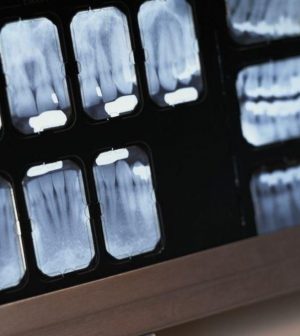- The Best Time of Day to Drink Bone Broth to Maximize Health Benefits
- 8 Ways to Increase Dopamine Naturally
- 7 Best Breads for Maintaining Stable Blood Sugar
- Gelatin vs. Collagen: Which is Best for Skin, Nails, and Joints?
- The Long-Term Effects of Daily Turmeric Supplements on Liver Health
- Could Your Grocery Store Meat Be Causing Recurring UTIs?
- Are You Making This Expensive Thermostat Error This Winter?
- Recognizing the Signs of Hypothyroidism
- 10 Strategies to Overcome Insomnia
- Could Artificial Sweeteners Be Aging the Brain Faster?
Missing Teeth, Higher Odds for Dementia?

Brushing and flossing is good not only for your teeth: It might also benefit your brain, a new study suggests.
The findings showed that tooth loss is tied to an increased risk of dementia, though getting dentures may help reduce that risk.
For the study, New York University researchers analyzed 14 studies that included more than 34,000 older adults and nearly 4,700 with diminished thinking (“cognitive function”) skills.
The investigators found that adults with more tooth loss had 1.48 times the risk of developing impaired thinking and a 1.28 times increased risk of dementia.
“Our findings underscore the importance of maintaining good oral health and its role in helping to preserve cognitive function,” said senior author Bei Wu, co-director of the Aging Incubator at New York University in New York City.
The more teeth lost, the greater the risk, her team found.
Each additional tooth lost was associated with a 1.4% higher risk of thinking impairment and 1.1% higher risk of being diagnosed with dementia.
But timely treatment with dentures may help, the findings suggest.
People who were missing teeth were less likely to have impaired thinking if they had dentures (nearly 17%) than if they did not (24%), according to the report published July 8 in JAMDA: The Journal of Post-Acute and Long-Term Care Medicine.
About one in six U.S. seniors have lost all of their teeth, according to the U.S. Centers for Disease Control and Prevention.
The new study did not prove a cause-and-effect relationship. However, previous research has found a link between tooth loss and cognitive decline and suggested a number of possible reasons.
Missing teeth make it difficult to chew, which may lead to nutritional deficiencies or trigger brain changes. There’s also increasing evidence of a connection between gum disease (a leading cause of tooth loss) and thinking decline.
Also, tooth loss may be caused by lifelong socioeconomic disadvantages that are also risk factors for cognitive decline.
“Given the staggering number of people diagnosed with Alzheimer’s disease and dementia each year, and the opportunity to improve oral health across the lifespan, it’s important to gain a deeper understanding of the connection between poor oral health and cognitive decline,” Wu said in a university news release.
More information
The U.S. National Institute on Aging has more about dementia.
SOURCE: New York University, news release, July 8, 2021
Source: HealthDay
Copyright © 2026 HealthDay. All rights reserved.










